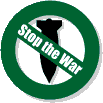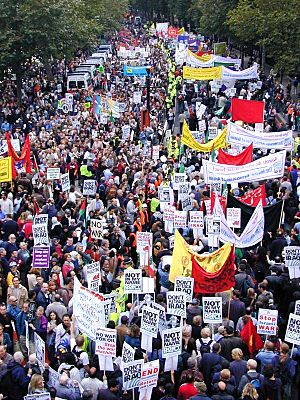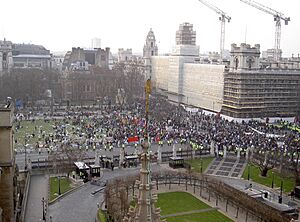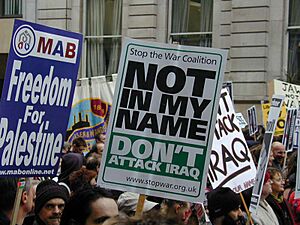Stop the War Coalition facts for kids
 |
|
| Abbreviation | StWC |
|---|---|
| Founded | 21 September 2001 |
| Type | Advocacy group |
| Focus | Anti-war, peace |
| Location |
|
|
Area served
|
United Kingdom |
| Method | Demonstration |
|
President
|
Brian Eno |
|
Key people
|
Andrew Murray, Lindsey German, Tony Benn, George Galloway, Jeremy Corbyn |
The Stop the War Coalition (StWC) is a group in the United Kingdom. It works to stop the UK from getting involved in military conflicts around the world.
The group started on 21 September 2001. Its first goal was to protest against the war in Afghanistan. Later, it strongly campaigned against the invasion of Iraq in 2003. A large protest organized by StWC on 15 February 2003 was the biggest public demonstration in British history.
Since then, the Coalition has spoken out against other conflicts. This includes the military action in Libya in 2011 and the UK's involvement in the war against the Islamic State. They argued that airstrikes would make extremism worse. The group also opposed sending military help to Ukraine during the Russian invasion. They believed it risked a bigger war between NATO and Russia. StWC has also called for ceasefires in the war between Russia and Ukraine and in the Israel–Gaza war.
Contents
How the Coalition Started and Key People
The idea for the Stop the War Coalition came after the September 11 attacks in the United States. Many people worried about new wars. The Coalition officially began at a public meeting in London on 21 September 2001. About 2,000 people attended this first meeting.
The group's main goal was simple: to bring together everyone who wanted to stop wars. They also wanted to share anti-war ideas that were not often heard in the news. Important early supporters included former politicians like Tony Benn, George Galloway, and Jeremy Corbyn. Other well-known people like Tariq Ali and Harold Pinter also supported the group.
Lindsey German became a key leader of the Coalition. The group quickly gained wide support from many different people and organizations. This included retired military officers, peace activists, trade unions, and the Muslim community. By 2003, groups like Greenpeace, the Liberal Democrats, and the Scottish National Party had also joined the Coalition.
From the start, the Coalition also used the slogan "Against the racist backlash." They worried that a war in Afghanistan might be seen as an attack on Islam. They feared this could lead to racist attacks against Muslims in the UK. The Coalition worked closely with the Muslim Association of Britain to organize its protests.
Andrew Murray was the first chairperson of the group. Other important members have included George Galloway and Salma Yaqoob.
Protesting the Iraq War and Other Conflicts (2003–2010)
The Road to the Iraq War
The biggest protest organized by the Stop the War Coalition happened on 15 February 2003. This massive demonstration in London was against the upcoming invasion of Iraq. It is believed to be the largest protest ever in the UK. Estimates say between 750,000 and 2,000,000 people attended. The march started earlier than planned because so many people arrived. Famous speakers at the rally in Hyde Park included Tony Benn and Jesse Jackson.
As the military preparations for war continued, StWC asked its supporters to organize actions on the day the invasion began. This day was called "Day X." When the war started on 20 March 2003, protests happened all over the country. In London, a large protest took place in Parliament Square. Many school students also walked out of their classes to join the protests.
After the war started, the Coalition organized another national protest on 22 March. While not as large as the 15 February march, it was still a very big anti-war demonstration held during wartime.
Anti-War Activities (2003–2005)
The Coalition continued to hold protests. In November 2003, they marched against what they called the aggressive foreign policy of the U.S. President George W. Bush. They also protested against the detention of prisoners at Guantanamo Bay, which they said violated human rights. A large rally was held in Trafalgar Square. The Coalition estimated 300,000 people attended this protest.
On 19 March 2005, StWC organized another big protest in Westminster. Supporters marched from Hyde Park to Parliament Square. They called for troops to leave Iraq and for the US not to attack Iran and Syria. They also wanted the British government to protect civil liberties, like the right to protest. Estimates for this march ranged from 45,000 to over 100,000 people. It was the first time a march had passed the US embassy in London since the Vietnam War protests.
After the London Bombings (2005)
After the 7 July 2005 London bombings, StWC held vigils for the victims. They also organized a large demonstration on 24 September 2005. The slogans for this protest included "Stop the Bombings" and "Bring the Troops Home." They also called to "Defend Civil Liberties" and "Defend the Muslim Community." This protest happened just before the Labour Party Conference.
In December 2005, StWC held an International Peace Conference with about 1,500 attendees. Speakers from around the world shared their views. The conference called for an international demonstration on 18 March 2006. In London, between 80,000 and 100,000 people participated in this march.
Protests continued in 2006 and 2007. A demonstration was held outside the Labour Party Conference in Manchester in September 2006. In February 2007, StWC organized a march in London with the Campaign for Nuclear Disarmament (CND). The main messages were "No Trident" (against nuclear weapons) and "Troops Out of Iraq."
On 15 March 2008, another international protest marked five years since the Iraq invasion. Around 40,000 people marched in London.
Protests and Rallies (2009)
In March 2009, a StWC meeting caused some discussion when a leader said he supported groups like Hezbollah and Hamas. He called them "resistance" groups.
On 1 April 2009, a march from the American embassy to Trafalgar Square brought together several protest groups. The next day, 200 people protested outside the ExCeL Centre in London during the G20 summit.
Later Campaigns: Libya, Syria, and Ukraine (2011–2015)
Libyan Civil War (2011)
Stop the War opposed the UK's involvement in the Libyan Civil War. They believed that outside military action would not help.
Syrian Civil War (2011–2014)
StWC also campaigned against British involvement in the Syrian civil war. This conflict began in March 2011. The group organized protests before votes in the British Parliament in 2013 and 2015.
Some commentators praised StWC for their judgment on these issues. They said the group often had better information than government agencies. The vote in August 2013 against military action in Syria was seen as a success for the anti-war movement.
However, some people accused Stop the War of having links to the Assad government in Syria. A StWC vice-president once said that the Assad family had a "long history of resisting imperialism."
Crimea (2014)
When Russia took over Crimea in 2014, Stop the War was criticized for seeming to support Russia's actions.
Jeremy Corbyn and the Labour Party (2015)
Jeremy Corbyn was the chairperson of the Stop the War Coalition from 2011. When he ran to become the leader of the Labour Party in 2015, StWC leaders supported him. After he became Labour leader in September 2015, he stepped down as StWC Chair but continued to support the group.
The November 2015 Paris Attacks
After the November 2015 Paris attacks, StWC published an article on its website. The article suggested that Western support for extremist violence in the Middle East led to the attacks. This article was strongly criticized by many politicians and was quickly removed from the website. StWC later apologized for it.
Some Labour MPs, like Hilary Benn, said the article was "wholly wrong." They argued that the attackers were to blame, not France. This event led to some Green Party members, like MP Caroline Lucas, resigning from StWC.
Syrian Civil War (late 2015)
In late 2015, the UK Parliament voted on whether to carry out airstrikes against ISIL in Syria. Stop the War actively lobbied Members of Parliament (MPs) to vote against the proposal. Some MPs reported receiving strong pressure, which led to discussions about intimidation.
The Labour Party allowed its MPs a "free vote" on the issue, meaning they could vote as they wished. This decision was criticized by StWC. The vote took place on 2 December, and the government won with support from some Labour MPs. Hilary Benn gave a powerful speech supporting the airstrikes. An article on the StWC website criticized his speech, but it was also quickly removed. The editor of the website resigned.
Some critics, including human rights activist Peter Tatchell, said that Stop the War had "lost its moral compass." They argued that the group focused too much on opposing Western actions and ignored crimes by other governments, like Russia and Iran. However, StWC stated on its website that it does not support the Assad government. It believes that the Syrian people should decide their country's future without outside interference.
Corbyn and the StWC Christmas Dinner (2015)
Jeremy Corbyn's continued involvement with StWC caused tension within the Labour Party. Some former Labour ministers called StWC a "disreputable organization" with "abhorrent views." They urged Corbyn to distance himself from the group.
Corbyn attended StWC's fundraising Christmas dinner on 11 December. He went to formally hand over his position as StWC's chair to Andrew Murray. In his speech, Corbyn said the "anti-war movement has been a vital force at the heart of our democracy."
After 2016
Syria and Israel Topics (2016–2019)
In October 2016, during the siege of Aleppo by the Syrian government (backed by Russia), some protesters criticized Jeremy Corbyn at a StWC conference. They felt he should have called for a change in government in Syria.
A few days later, Boris Johnson questioned why StWC was not protesting against Russia's actions in Syria. A StWC leader, Chris Nineham, responded that protests in Britain could influence what Britain and its allies do. He felt a protest outside the Russian embassy would not make a difference to Russia's actions. He also said it might increase "hysteria" against Russia. These comments were widely criticized.
Peter Tatchell again criticized StWC in December 2016. He said the group was "more interested in fighting the West than fighting for Syrians." He argued that StWC did not campaign for aid for civilians in Aleppo. He urged Jeremy Corbyn to distance himself from the group.
In April 2018, StWC opposed Western airstrikes in Syria. These strikes were in response to a chemical attack. StWC claimed that most people in the UK opposed the action. However, fact-checks showed the public was actually evenly split.
Recent Activities (2020–2021)
In 2020, StWC protested against a potential war with Iran. This was after the US killed an Iranian general. StWC called the killing "an act of war."
In May and June 2021, StWC protested alongside the Palestine Solidarity Campaign. They demonstrated against Israeli airstrikes on Gaza and called for sanctions on Israel.
Ukraine (2022)
In February 2022, Stop the War released a statement on the Russian invasion of Ukraine. They said they opposed any war over Ukraine. They believed the crisis should be solved by respecting Ukraine's right to choose its future and addressing Russia's security concerns. The statement also criticized NATO for what it called "alleged aggression against Russia."
Eleven Labour MPs signed this statement, including John McDonnell and Diane Abbott. However, Labour Party leader Keir Starmer strongly criticized it. He said StWC was "naive" or even "actively give succour to authoritarian leaders." Starmer threatened to remove the Labour Party's support from the MPs if they did not withdraw their signatures, which they did.
Stop the War also opposed countries sending weapons to Ukraine. They accused NATO and the EU of "warmongering." Jeremy Corbyn supported StWC, saying they "stand up for peace around the world." However, others argued that StWC's position was out of step with many trade unions that supported Ukraine's right to resist.
Israel/Gaza (2023)
During the Israel–Gaza war, StWC was one of the main organizers of several demonstrations. These protests happened alongside other groups like the Palestine Solidarity Campaign. One large demonstration took place on 11 November.
Notable Members
- Diane Abbott, a politician and StWC Patron.
- Tariq Ali, a writer and activist, and StWC Vice-President.
- Tony Benn, a former politician and StWC President (2001–2014).
- Brian Eno, a musician and the current StWC President.
- George Galloway, a former politician and StWC Vice-President.
- Lindsey German, a key leader (convenor) of StWC.
- Jeremy Corbyn, a politician, former StWC chair (2011–2015), and former Labour Party leader.
- Kate Hudson, an StWC officer and chair of the Campaign for Nuclear Disarmament (CND).
- Caroline Lucas, a Green Party politician and former StWC Vice-President (resigned December 2015).
- Andrew Murray, a key leader (chair) of StWC at different times.
- Mark Rylance, an actor and StWC Patron.
- Salma Yaqoob, a politician and co-founder of the Respect Party.
See also
- Campaign Against Arms Trade
- List of anti-war organisations
- List of peace activists
 | Emma Amos |
 | Edward Mitchell Bannister |
 | Larry D. Alexander |
 | Ernie Barnes |





